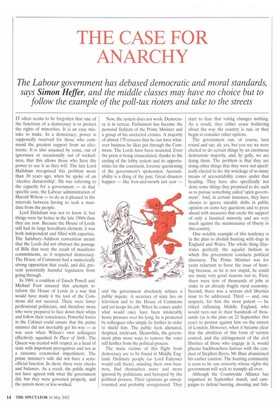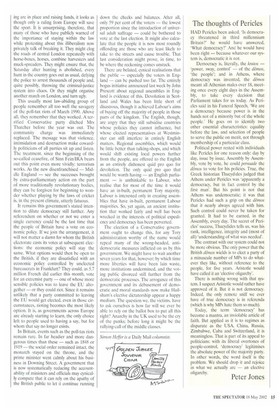THE CASE FOR ANARCHY
The Labour government has debased democratic and moral standards, says Simon Heifer, and the middle classes may have no choice but to follow the example of the poll-tax rioters and take to the streets
IT often seems to be forgotten that one of the functions of a democracy is to protect the rights of minorities. It is an easy mistake to make. In a democracy, power is supposedly reserved for those who command the greatest support from an electorate. It is also assumed by some, out of ignorance or occasionally out of wickedness, that this allows those who have the power to use it as they will. The late Lord Hailsham recognised this problem more than 30 years ago, when he spoke of an 'elective dictatorship'. He was referring to the capacity for a government — in that specific case, the Labour administration of Harold Wilson — to do as it pleased in the intervals between having to seek a mandate from the people.
Lord Hailsham was not to know it, but things were far better in the late 1960s than they are now. Because the House of Lords still had its large hereditary element, it was both independent and filled with expertise. The Salisbury–Addison convention meant that the Lords did not obstruct the passage of Bills that were the result of manifesto commitments, so it respected democracy. The House of Commons had a numerically strong opposition that could, and did, prevent potentially harmful legislation from going through.
In 1969, a coalition of Enoch Powell and Michael Foot ensured that attempts to reform the House of Lords in a way that would have made it the tool of the Commons did not succeed. There were fewer professional politicians, and therefore more who were prepared to face down their whips and follow their consciences. Powerful forces in the Cabinet could ensure that the prime minister did not inevitably get his way — as was seen when Wilson's own colleagues effectively squashed In Place of Strife. The Queen was treated with respect as a head of state with important prerogatives and not as a tiresome ceremonial impediment. The prime minister's wife did not have a semiofficial function. In short, there were checks and balances, As a result, the public might not have agreed with what the government did, but they were governed properly, and the system more or less worked.
Now, the system does not work. Democracy is in retreat. Parliament has become the personal fiefdom of the Prime Minister and a group of his unelected cronies. A majority of almost 170 ensures that he can have whatever business he likes put through the Commons. The Lords have been neutered, Even the press is being emasculated, thanks to the ending of the lobby system and its opportunities for the consistent, forensic questioning of the government's spokesmen. Accountability is a thing of the past. Great disasters happen — like foot-and-mouth last year —
and the government absolutely refuses a public inquiry. A secretary of state lies on television and to the House of Commons and yet keeps his job. When he comes under what would once have been intolerably heavy pressure over his lying, he is protected by colleagues who simply lie further in order to shield him. The public feels alienated, despised, irrelevant. Meanwhile, the government plots more ways to remove the voter still further from the political process.
The main victims of this flight from democracy are to be found in Middle England. Ordinary people (as Lord Falconer would call them), minding their own business, find themselves more and more ignored by politicians and betrayed by the political process. Their opinions go unrepresented and probably unregistered. They start to fear that voting changes nothing. As a result, they either cease bothering about the way the country is run, or they begin to consider other options.
The government can, of course, turn round and say: ah, yes, but you see we were elected to do certain things by an enormous democratic majority, and, by golly, we are doing them. The problem is that they are doing other things that they were not specifically elected to do: the wreckage of so many means of accountability comes under that heading. They have also specifically not done some things they promised to do, such as to pursue something called 'open government'. And, in certain instances, they have chosen to ignore sizeable shifts in public opinion on some key questions and to press ahead with measures that excite the support of only a fanatical minority and are very much against the maintenance of liberty in this country.
One notable example of this tendency is in the plan to abolish hunting with dogs in England and Wales. The whole thing illustrates perfectly the squalid fashion in which this government conducts political discourse. The Prime Minister was for years reluctant to force the issue of hunting because, as he is not stupid, he could see many very good reasons not to. First, there were tens of thousands of jobs at stake in an already fragile rural economy. Second, there was a serious civil liberties issue to be addressed. Third — and, one suspects, for him the most potent — he risked inflaming Middle England, who would turn out in their hundreds of thousands (as is the plan on 22 September this year) to protest against him on the streets of London. However, when it became clear that the abolition of this form of vermin control, and the infringement of the civil liberties of those who engage in it, would placate backbenchers furious with the conduct of Stephen Byers, Mr Blair abandoned his earlier caution. The hunting community is soon to be one minority whose rights the government will seek to trample all over.
Although the Countryside Alliance has organised its September march, and campaigns to defend hunting, shooting and fish ing are in place and raising funds, it looks as though only a ruling from Europe will save the sport. It is unsurprising, therefore, that many of those who have publicly warned of the importance of staying within the law while protesting about this illiberalism now privately talk of breaking it. They might clog the roads of central London repeatedly with horse-boxes, horses, combine harvesters and muck-spreaders. They might ensure that, the Saturday after hunting is abolished, every hunt in the country goes out as usual, defying the police to arrest thousands of people and, quite possibly, throwing the criminal-justice system into chaos. Or they might organise another march on London, and turn ugly.
This usually most law-abiding group of people remember all too well the savagery of the poll-tax riots of March 1990. Above all, they remember that they worked. A terrified Conservative party ditched Mrs Thatcher before the year was out. The community charge was immediately replaced. The message was that violence, intimidation and destruction make cowardly politicians of all parties sit up and listen. The treatment, since the beginning of the so-called ceasefire, of Sinn Fein/IRA bears out this point even more vividly: terrorism works. As the new disenfranchised — Middle England — see the successes brought by extra-parliamentary action on the part of more traditionally revolutionary bodies, they can be forgiven for beginning to wonder whether playing by the laws of cricket is, in the present climate, utterly fatuous.
It remains this government's stated intention to dilute democracy still further. Any referendum on whether or not we enter a single currency could be the last time that the people of Britain have a vote on economic policy. If we join the arrangement, it will not matter a damn for whom the British electorate casts its votes at subsequent elections: the economic policy will stay the same. What options would then be open to the British. if they are dissatisfied with an economic policy controlled by unelected bureaucrats in Frankfurt? They could, as 5.7 million French did earlier this month, vote for an extremist party — one of whose more sensible policies was to leave the EU altogether — or they could riot. Since it remains unlikely that a party committed to leaving the EU would get elected, even in those circumstances, rioting becomes the most likely option. It is, as governments across Europe are already starting to learn, the only choice left to people used to having a say, but for whom that say no longer exists.
In Britain, events such as the poll-tax riots remain rare. In far headier and more dangerous times than these — such as 1848 or 1919 the social order remained intact, the monarch stayed on the throne, and the prime minister went calmly about his business in Downing Street. A government that is now systematically reducing the accountability of ministers and officials may cynically compute that it can rely on the apathy of the British public to let it continue running down the checks and balances. After all, only 59 per cent of the voters — the lowest proportion since the introduction of universal adult suffrage — could be bothered to vote at the last election. It might also calculate that the people it is now most roundly offending are those who are least likely to take to the streets and cause trouble. That last consideration might prove, in time, to be where the reckoning comes unstuck.
There are belated, cynical realisations that the public — especially the voters in England — can be pushed too far. The entirely bogus initiative announced last week by John Prescott about regional assemblies in England is evidence of this. Devolution in Scotland and Wales has been little short of disastrous, though it achieved Labour's aims of buying off the majority of people in those parts of the kingdom. The English, though, are angry that they still subsidise countries whose policies they cannot influence, but whose elected representatives at Westminster can still interfere in entirely English matters. Regional assemblies, which would be little better than talking-shops, and which would shift existing local powers further from the people, are offered to the English as an entirely dishonest quid pro quo for devolution. The only quid pro quo that would be worth having — an English parliament — is unthinkable to Labour, who realise that for most of the time it would have an in-built, permanent Tory majority. Labour is interested only in creating assemblies that have in-built, permanent Labour majorities. So, yet again, an ancient institution that worked fairly and well has been wrecked in the interests of political expediency and democracy has been perverted.
The election of a Conservative government ought to change this, for any Tory administration worthy of the name would repeal many of the wrong-headed, antidemocratic measures inflicted on us by this government. We might have to wait another seven years for that, however; by which time more liberties will have been lain waste, more institutions undermined, and the voting public divorced still further from the democratic processes. The arrogance of this government and its debasement of democratic and moral standards now make Hailsham's elective dictatorship appear a happy medium. The question we, the victims, have to ask ourselves is how far will we ever be able to rely on the ballot box to put all this right? Anarchy in the UK used to be the cry of the punks; before long it might be the rallying-call of the middle classes.















































































 Previous page
Previous page